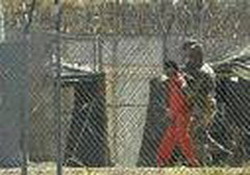Officer calls Guantanamo reviews a sham
- Submitted by: admin
- International
- North America
- 07 / 29 / 2007

Lt. Col. Stephen Abraham, a military intelligence officer who spent six months at the US Defense Department working in the office that reviews the government's cases against detainees held at the US prison in Guantanamo Bay, became the first military insider to urge Congress to scrap the military-run reviews conducted on the naval base and give detainees access to U.S. courts.
On Friday, Abraham described the reviews, known as Combatant Status Review Tribunals, as "designed not to ascertain the truth, but to legitimize the detentions."
"What we were handed were diluted, watered-down summaries, and it was the best they had," Abraham, who participated in a detainee review as part of his assignment, told members of the House Armed Services committee. "We said it was not good enough to justify holding someone for the rest of their life," he stated.
Abraham's testimony came as the committee considers legislation that would give those held captive at Guantanamo the right to challenge their detentions in civil court. The Senate Judiciary Committee last month approved a bill that would restore the rights of so-called enemy combatants to challenge their detentions through traditional habeas corpus petitions in U.S. District Court.
Abraham described a system of sham trials, "an effort to lend a veneer of legitimacy to the detentions, to launder decisions already made." He said the reviewers were provided with "vague, generalized data" from unknown sources that made it impossible to decide whether a detainee should be classified as an enemy combatant. The reviewers also were constantly prodded to speed up the process, he said.
Abraham said the three-officer panel he served on agreed that there was no credible evidence that one detainee, Abdullah al Ghazawy, was a member of the Libyan Islamic Fighting Group, as the government alleged. But the panel was ordered not to close the case to allow for further evidence to be introduced, he said. No new evidence arrived, and Abraham said the panel stuck to its guns.
Abraham said he later learned that a second panel was convened two months later to hear al Ghazawy's case. It "reached a different result," Abraham said, and he was never assigned to another case. He said the second panel also reconsidered and overturned the finding of another panel that a detainee wasn't an enemy combatant.
"The process ensured that panels would rubber-stamp decisions already made," he said.
Source: Periodico26.cu
On Friday, Abraham described the reviews, known as Combatant Status Review Tribunals, as "designed not to ascertain the truth, but to legitimize the detentions."
"What we were handed were diluted, watered-down summaries, and it was the best they had," Abraham, who participated in a detainee review as part of his assignment, told members of the House Armed Services committee. "We said it was not good enough to justify holding someone for the rest of their life," he stated.
Abraham's testimony came as the committee considers legislation that would give those held captive at Guantanamo the right to challenge their detentions in civil court. The Senate Judiciary Committee last month approved a bill that would restore the rights of so-called enemy combatants to challenge their detentions through traditional habeas corpus petitions in U.S. District Court.
Abraham described a system of sham trials, "an effort to lend a veneer of legitimacy to the detentions, to launder decisions already made." He said the reviewers were provided with "vague, generalized data" from unknown sources that made it impossible to decide whether a detainee should be classified as an enemy combatant. The reviewers also were constantly prodded to speed up the process, he said.
Abraham said the three-officer panel he served on agreed that there was no credible evidence that one detainee, Abdullah al Ghazawy, was a member of the Libyan Islamic Fighting Group, as the government alleged. But the panel was ordered not to close the case to allow for further evidence to be introduced, he said. No new evidence arrived, and Abraham said the panel stuck to its guns.
Abraham said he later learned that a second panel was convened two months later to hear al Ghazawy's case. It "reached a different result," Abraham said, and he was never assigned to another case. He said the second panel also reconsidered and overturned the finding of another panel that a detainee wasn't an enemy combatant.
"The process ensured that panels would rubber-stamp decisions already made," he said.
Source: Periodico26.cu
Comments